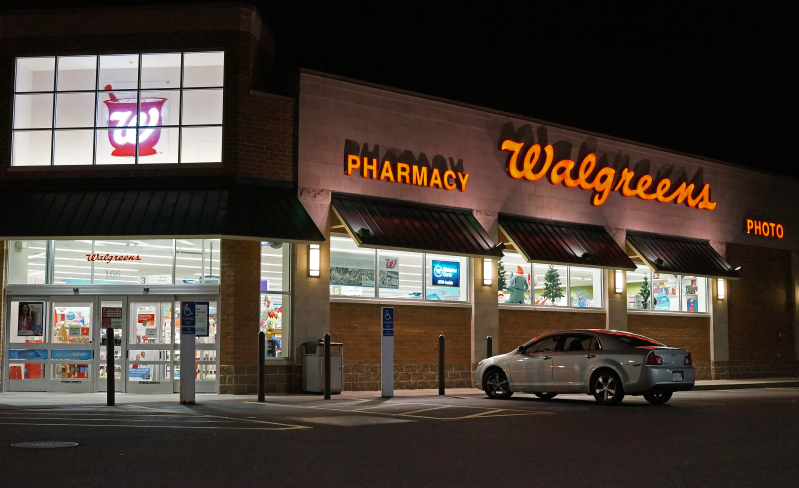
Drugstore chain Walgreens Boots Alliance Inc said on Tuesday it would acquire smaller peer Rite Aid Corp <RAD.N> for $9.4 billion to widen its footprint in the United States and negotiate for lower drug costs.
The $9-a-share cash deal, worth $17.2 billion including acquired debt, will increase the footprint of Walgreens, the largest U.S. drugstore chain, by half. It will also improve its ability to negotiate for low drug prices and fend off rivals from Wal-Mart Stores Inc <WMT.N> to online pharmacies.
The price represents a 48 percent premium to where Rite-Aid shares closed on Monday, the day before the agreement was signed, the companies said in a joint release.
A Walgreens-Rite Aid deal would need approval from the U.S. Federal Trade Commission, which studies retail mergers to ensure they comply with antitrust law.
Shares of Rite Aid, which had a market value of $6.36 billion at Monday's close, rose as much as 44 percent on Tuesday after the Wall Street Journal first reported the deal talks. Walgreens stock rose as much as 7 percent.
Walgreens said it expects the transaction to close in the second half of 2016 and to boost its earnings per share in the first full year after its completion. Moreover, it sees cost savings of more than $1 billion from buying Rite-Aid, which will initially operate under its existing brand name.
The healthcare sector has been consolidating in recent years as providers look to beef up and bargain for lower prices from drugmakers.
In part, that is because President Barack Obama's national healthcare reform law seeks to limit spending by cutting payments in government insurance programs. Large companies that provide health benefits have also tightened their spending.
'ROBUSTLY COMPETITIVE'
Hospitals, drug distributors, health insurers and companies that manage pharmacy benefits all say that they need to be bigger to compete in this new landscape.
Analysts said the deal would increase Walgreens' presence in the Pacific Northwest and make it better able to take on CVS Health Corp <CVS.N>, the nation's largest drug chain in terms of sales.
CVS, whose shares rose 1.8 percent on Tuesday, in August closed its $10.1 billion acquisition of pharmacy services provider Omnicare, which will expand its presence in the senior care market.
Antitrust lawyer David Balto, a former FTC official, earlier on Tuesday said the Walgreens-Rite-Aid deal would receive careful scrutiny by U.S. regulators and then probably be approved.
"Drugstore services have evolved substantially in the past several years," he said, "and the market is becoming robustly competitive, with substantial competition from supermarkets and mass merchants."
Others said that given an extended FTC review of office supplies retailer Staples Inc's <SPLS.O> planned takeover of Office Depot Inc <ODP.O>, the Walgreens-Rite Aid deal would also be closely scrutinized.
Many analysts expect some divestitures to be required in states where the combined company would have a particularly strong position, including parts of the northeast. In New York, for instance, the two have more than 25 percent of the market by store count, Cowen analysts said.
Walgreens has 13,200 stores, some 60 percent of which are in the United States, and generated $76.4 billion in sales in the year ended on Aug. 31, 2014. Rite Aid, with 4,570 U.S. stores, has annual sales of about $27 billion.
CVS had sales of $139.4 billion last year. But it has 7,870 stores, fewer than Walgreens.
While Walgreens focuses more on its retail drugstore business, CVS, through its 2007 acquisition of CareMark, is also the second largest pharmacy-benefit manager in the U.S.
Pharmacy benefit managers are paid by health plans to
ensure drugstores only dispense medicines on the plan's list of
pre-authorized drugs - a middleman role designed to keep drug
costs down.
"This would be a merger that's really about increasing scale" and getting cost savings, said Tigress Financial Partners Research Director Philip Van Deusen.
Increased scale would help the combined company better withstand pricing pressure from major retailers, including Internet players like Amazon.com Inc that sell many of the same products, Deusen said.
(Additional reporting by Greg Roumeliotis and Lauren Hirsch in New York, Diane Bartz in Washington and Caroline Humer in New York)






